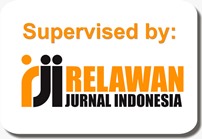THE EFFECT OF E-GOVERNMENT QUALITY (E-GOVQUAL) ON LOCAL GOVERNMENT E-GOVERNMENT USER SATISFACTION
Abstract
The measurement of E-Government user satisfaction at local governments in Indonesia still needs to be improved to achieve the high accountability demanded by the central government. Based on the theory of behavior, six factors influence the satisfaction of local government E-Government users, namely knowledge of ease of use, trust, function and form interaction, reliability, content and display of information, and support. This study examines the influence of these six factors on the E-Government Quality of local governments in the province of West Java. Respondents in this study were the head of the West Java regional government agency. This study uses PLS-SEM and succeeds in proving that there is a positive and significant effect of ease of use, trust, function and form interaction, reliability, content and display of information, and support for local government E-Government user satisfaction. These findings provide practical contributions as a guide for local governments to improve E-Government Quality. Future research needs to expand the scope of the observation area, incorporate subjective and objective scales of user satisfaction variables, and develop other variables based on other theories such as contingency theory, agency theory, and dynamic capabilities theory.
Full Text:
PDFReferences
Alzola, L. M., & Robaina, V. P. (2005). SERVQUAL: its applicability in electronic commerce B2C. Quality Management Journal, 12(4), 46–57.
Carter, L., & Bélanger, F. (2005). The utilization of e‐government services: citizen trust, innovation and acceptance factors. Information Systems Journal, 15(1), 5–25.
Evans, D., & Yen, D. C. (2006). E-Government: Evolving relationship of citizens and government, domestic, and international development. Government Information Quarterly, 23(2), 207–235.
Ganguli, S., & Roy, S. K. (2011). Generic technology‐based service quality dimensions in banking: Impact on customer satisfaction and loyalty. International Journal of Bank Marketing.
Hamid, A. A. (2018). Analisis Pengaruh Kinerja Keuangan Daerah Terhadap Tingkat Kesejahteraan Masyarakat Kabupaten Majalengka–Jawa Barat. Jurnal SEKURITAS (Saham, Ekonomi, Keuangan Dan Investasi), 1(4).
Heeks, R. (2003). Most eGovernment-for-development projects fail: how can risks be reduced?
Indonesia, P. R. (2003). Instruksi Presiden Republik Indonesia Nomor 3 Tahun 2003 tentang Kebijakan dan Strategi Nasional Pengembangan E-Government. Jakarta: Sekretaris Negara.
Kotler, P., & Keller, K. . (2012). Marketing Management, 14th ed., Pearson Education, Upper Saddle River, NJ.
Lupiyoadi, R. (2013). Manajemen Pemasaran Jasa (Praktik dan Teori). Jakarta: PT. Salemba Empat.
Papadomichelaki, X., & Mentzas, G. (2012). e-GovQual: A multiple-item scale for assessing e-government service quality. Government Information Quarterly, 29(1), 98–109.
Parasuraman, A., Zeithaml, V. A., & Berry, L. L. (1985). A Conceptual Model of Service Quality and Its Implications for Future Research. Journal of Marketing, 49(4), 41. https://doi.org/10.2307/1251430
Puspitasari, A. (2017). Penggunaan Fuzzy Inference System (FIS) Metode Mamdani Untuk Menentukan Kinerja Pelayanan PDAM. Jurnal Teknik Komputer AMIK BSI, 3(1), 51–59.
Schaupp, L. C., & Carter, L. (2005). E‐voting: from apathy to adoption. Journal of Enterprise Information Management.
Setneg. (2018). Peraturan Presiden Republik Indonesia Nomor 95 Tahun 2018 Tentang Sistem Pemerintahan Berbasis Elektronik.
Shareef, M. A., Kumar, V., Kumar, U., & Dwivedi, Y. K. (2011). e-Government Adoption Model (GAM): Differing service maturity levels. Government Information Quarterly, 28(1), 17–35.
Shareef, M. A., Kumar, V., Kumar, U., & Hasin, A. A. (2009). Diffusion of innovation and capability theory in the context of e-government. In Handbook of research on contemporary theoretical models in information systems (pp. 193–211). IGI Global.
Sugiyono. (2017). Metode Penelitian Penelitian Kuantitatif, Kualitatif dan R&D. In Bandung: Alfabeta.
Wang, L., Bretschneider, S., & Gant, J. (2005). Evaluating web-based e-government services with a citizen-centric approach. Proceedings of the 38th Annual Hawaii International Conference on System Sciences, 129b-129b.
DOI: https://doi.org/10.31846/jae.v11i3.678
Refbacks
- There are currently no refbacks.

This work is licensed under a Creative Commons Attribution-NonCommercial-NoDerivatives 4.0 International License.
e-Jurnal Apresiasi Ekonnomi Indexed by:












